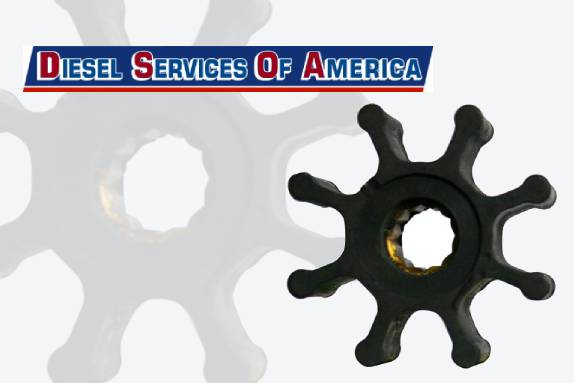
A vessel’s diesel engine is an intricate, powerful, and seemingly complex piece of equipment. The same can be said for their raw water cooling systems. Diesel Services of America and our team of experts stand by the notion that a well-attended professional maintenance schedule is the best way to extend the life of your engine and improve your overall experience. But it always helps for a boat owner to be well versed in the different components of a diesel system as well as knowing the signs of trouble. Today we will be taking a look at a vital piece of this puzzle: Raw Water Cooling Systems.
There are two main types of cooling apparatuses involved when talking about marine diesel engines. Depending on the model, your engine will either have an enclosed cooling system (similar to that of a car) or a raw water cooling system. We will be exploring the latter in this article.
Many people hear the words “cooling system” and their minds immediately jump to Antifreeze. It is true that antifreeze plays a vital role in the maintenance of your diesel. However, this harsh chemical can be extremely harmful if mishandled and its use varies greatly between the different types of cooling systems. If your engine is dependent on a raw water system, there are a few other components that may need your more pressing attention.
Raw Water Cooling System- Common Problems
A raw water system pulls seawater in from the body surrounding your vessel in order to help cool the diesel. It has many parts that can easily erode due to the harsh nature of seawater and mechanical strain. Not least of these is the impeller– a circular, spoked, rotating piece of equipment in the pump. Many impellers are made of rubber which allows the pump to be self-priming. While this rubber is an industrial grade, the constant movement and stress on your engine’s cooling system can cause the impeller to be one of the most troublesome parts of a diesel engine system. This is exacerbated if a vessel is left idle for extended periods of time. This can cause the rubber spokes of the impeller to settle- this is commonly called “taking a set”- into a bent position.
There is also the issue of the sea strainer- sometimes referred to as a raw water strainer. First, water is brought in through a seacock. This is a specially designed valve in the hull of any boat with a raw water system. It then passes through the sea strainer before it can be used to siphon off excess heat in the engine. Much like the name suggests, the sea strainer filters out any large natural debris in the seawater being brought in by the pump. Keeping your cooling system free of these particles is vital. Not only can a faulty sea strainer cause a downtick in the efficiency of your marine diesel engine overall, but the detritus can cause the delicate mechanics of your cooling system to break down prematurely.
Luckily, with regular professional maintenance and a vigilant boat owner, these problems can be easily avoided. The Diesel Services of America team is here to help you navigate any question or issue that may come about in regards to raw water cooling systems and marine diesel engines in general. Connect with us via Facebook, Instagram, YouTube, or give us a call at 954-781-1464 to speak with one of our trained professionals!
Raw Water Cooling Systems
![]()